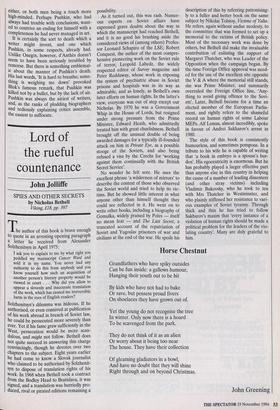Lord of the rueful countenance
John Jolliffe
SPIES AND OTHER SECRETS by Nicholas Bethell Viking, £18, pp. 397 The author of this book is brave enough to quote in an arresting opening paragraph a letter he received from Alexander Solzhenitsyn in April 1975: I ask you to explain to me by what right you peddled my manuscript Cancer Ward and sold it in my name. You never had any authority to do this from anybody and you know yourself how such an acquisition of another person's literary property would be viewed in court . . . Why did you allow to appear a slovenly and inaccurate translation of the work, which has caused me irreversible harm in the eyes of English readers?
Solzhenitsyn's dilemma was hideous. If he authorised, or even connived at publication of his work abroad in breach of Soviet law, he could be persecuted more severely than ever. Yet if his fame grew sufficiently in the West, persecution would be more scan- dalous, and might not follow. Bethel! does not quite succeed in answering this charge convincingly, though he devotes over two chapters to the subject. Eight years earlier he had come to know a Slovak journalist who claimed to be authorised by Solzhenit- syn to dispose of translation rights of his work. In 1968 when Bethell took a contract from the Bodley Head to Bratislava, it was signed, and a translation was hurriedly pro- duced, rival or pirated editions remaining a possibility. As it turned out, this was rash. Numer- ous experts on Soviet affairs have expressed grave doubts about the way in which the manuscript had reached Bethell, and it is no good his brushing aside the considered views of (among others) Profes- sor Leonard Schapiro of the LSE; Robert Conquest, the author of the most compre- hensive pioneering work on the Soviet rule of terror; Leopold Labedz, the widely respected editor of Survey magazine and Peter Reddaway, whose work in exposing the system of psychiatric abuse in Soviet prisons and hospitals was in its way as admirable, and as lonely, as Bethell's own later efforts on human rights. In the latter's view, everyone was out of step except our Nicholas. By 1970 he was a Government Whip in the House of Lords, but resigned under strong pressure from the Prime Minister, Edward Heath, who admittedly treated him with great churlishness. Bethell brought off the unusual double of being awarded damages for a typically ill-founded attack on him in Private Eye, as a possible stooge of the Soviets, and also being refused a visa by the Czechs for 'working against them continually with the British Secret Service'.
No wonder he felt sore. He uses the excellent phrase 'a wilderness of mirrors' to describe the context of those who observed the Soviet world and tried to help its vic- tims. But he showed little interest in what anyone other than himself thought they could see reflected in it. He went on to write other books, including a biography of Gomulka, widely praised by Poles — itself no mean feat — and The Last Secret, a truncated account of the repatriation of Soviet and Yugoslav prisoners of war and civilians at the end of the war. He spoils his description of this by referring patronising- ly to a fuller and better book on the same subject by Nikolai Tolstoy, Victims of Yalta. He refers, again without undue modesty, to the committee that was formed to set up a memorial to the victims of British policy. Most of the necessary work was done by others, but Bethell did make the invaluable contribution of enlisting the support of Margaret Thatcher, who was Leader of the Opposition when the campaign began. By the time Foreign Office approval was need- ed for the use of the excellent site opposite the V & A where the memorial still stands, she was Prime Minister, and summarily overruled the Foreign Office line, 'Any- thing to avoid giving offence to the Sovi- ets'. Later, Bethell became for a time an elected member of the European Parlia- ment, and rightly refers to the shameful record on human rights of some Labour MEPs. Alf Lomas, almost incredibly, spoke in favour of Andrei Sakharov's arrest in 1980.
The style of this book is consistently humourless, and sometimes pompous. In a tribute to his wife he is capable of writing that 'a book in embryo is a spouse's bur- den'. His egocentricity is enormous. But he has probably played a larger effective part than anyone else in this country in helping the cause of a number of leading dissenters (and other stray victims) including Vladimir Bukovsky, who he took to tea with Mrs Thatcher in Westminster, and who plainly stiffened her resistance to vari- ous examples of Soviet tyranny. Through thick and thin he has tried to follow Sakharov's maxim that 'every instance of a violation of human rights should be made a political problem for the leaders of the vio- lating country'. Many are duly grateful to him.


















































































 Previous page
Previous page